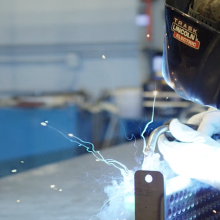How to walk in someone’s unwalked-in shoes
By guest columnist Tom Hayes
Two things that have informed my adult life are a couple events in my adolescent life. First, a good friend was in a car accident and became disabled from the waist down at age 17. Four years later, a virus attacked my dad’s spine while he slept leaving him unable to feel his legs the next morning. So I came to learn a thing or two about the challenges people who use wheelchairs face. Given that I was often called up to help them enter buildings and such, for a person not in a chair, I was a savant at sussing out whether or not a building was accessible. I also became excellent at tooling around my parent’s house in my dad’s wheelchair in the wheelie position (45 seconds through the dining room, around the living room and back!)
Another thing I often observed is how dog-gone often people became nervous around people in chairs. They fear uttering a clumsy phrase, “Did you walk here?” Or have a nagging need to know how someone came to be disabled. And finally, the insidious, unconscious assumption that the person in the chair is paralyzed from the neck up.
Over the years, my friend in a chair has developed an amazing technique for disarming people’s nervousness and demonstrating his own empathy for those who walk. When he senses that people are uncomfortable, he has this wonderful schtick. He grabs his leg and pulls it up so it crosses his knee. He points to his foot and starts going on about his wonderful shoes. He’ll exclaim: “I’ve had these shoes for more than a decade. And look at that tread—it hasn’t worn a bit. Boy, they don’t make shoes like these anymore.” Invariably the strangers nod in approval and agreement. Then suddenly they realize that he wasn’t just pulling up his own leg, he was pulling theirs—people who don’t walk, don’t wear out their shoes!
In the end, it’s just my friend’s way of saying, “I also noticed that I am in a wheelchair and it’s OK. And I also know that you are nervous because I am different from you.” With his empathy, he knocks down a barrier that would have made a relationship impossible.
In business, the importance of relationships is touted coast to coast. But what is often overlooked is that the secret ingredient to relationships, the power of empathy, which allows people and brands to make relationships with other human beings.
So what are the keys to building greater empathy for our customers and coworkers?
- Be human. Understanding others begins by understanding yourself. Knowing what makes you tick is critical, because there is so much we share with others of our species.
- Be open. Invariably we are selling to others who are different from us, so we need to be open to those differences. Being judgmental is an iron gate that will never let empathy in. Those who have sneering disdain for your customers have no place in any business.
- Be curious. Learning about others is a great adventure; enjoy every minute of it. And more often than not, people enjoy your interest in them. It starts with being present for others, asking thoughtful questions and absorbing everything they say.
- Be of service. Ask yourself, whose day will be better if they have my product or service? What is it in their lives that I will help? By understanding the practical and emotional needs your product or service addresses for your customers, you are well on your way to becoming empathetic.
A few years ago at my friend’s birthday party, I bought him a surprising gift: shiny, black, cap-toed, oxford shoes. He immediately exclaimed that he had never been given shoes for a birthday gift before. Then he turned the shoes over and noticed pronounced holes in the bottom leather and seriously worn down heels. As the other guests started wondering if I was paralyzed from the neck up, he began laughing. And now at parties he lifts up his shoes and complains, “I’ve only had these shoes for two months and look how terribly worn they are!”

About Tom Hayes
Tom and his team at Riley Hayes have been Creating with Joy since 1991. Tom is also a speaker and coauthor of Relevance: Matter More. Connect with Tom at thayes@rileyhayes.com.
Views expressed by guest columnist reflect those of the author and not the Minnesota Chamber of Commerce.



